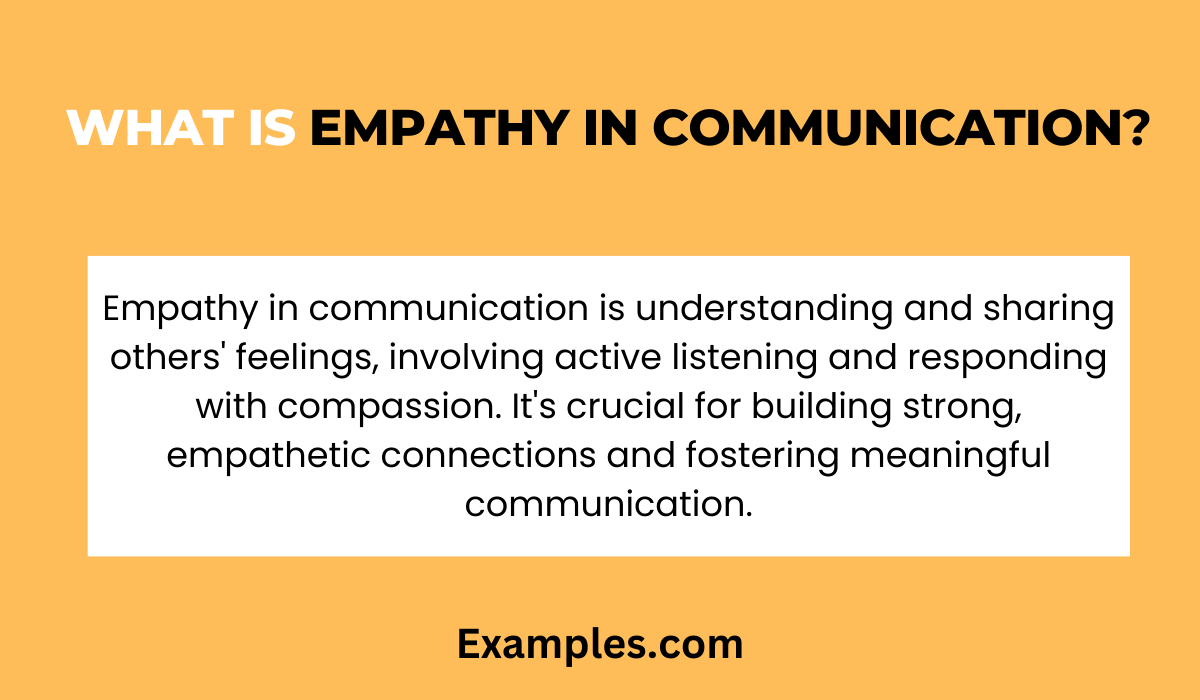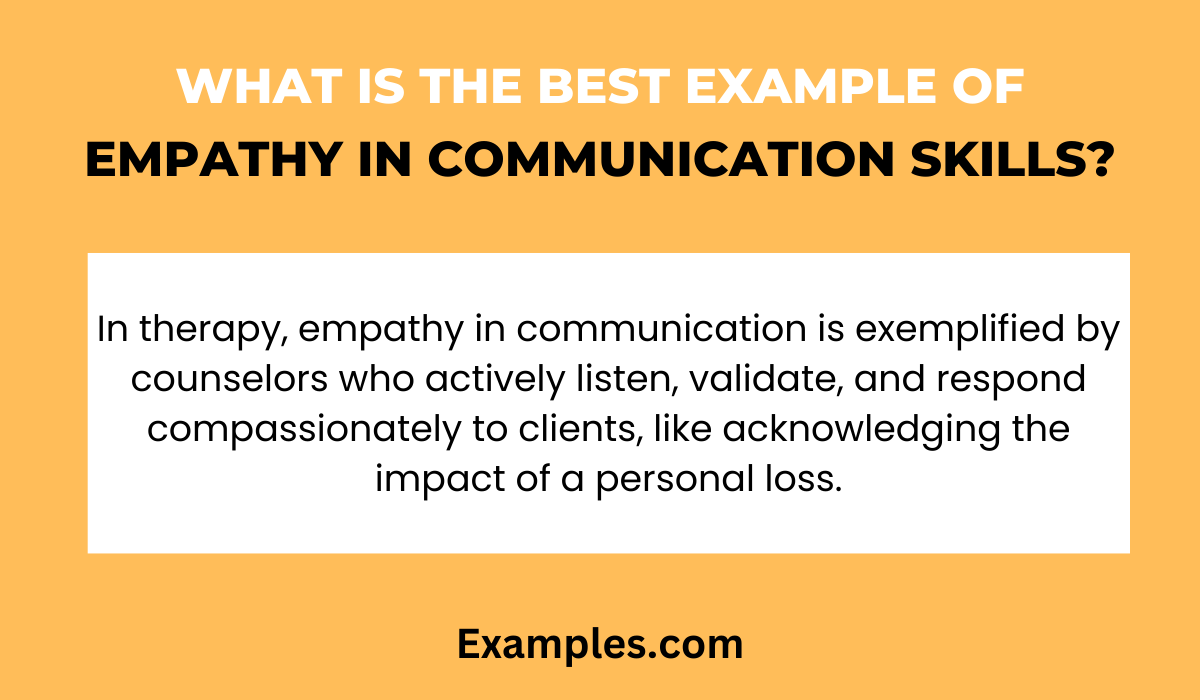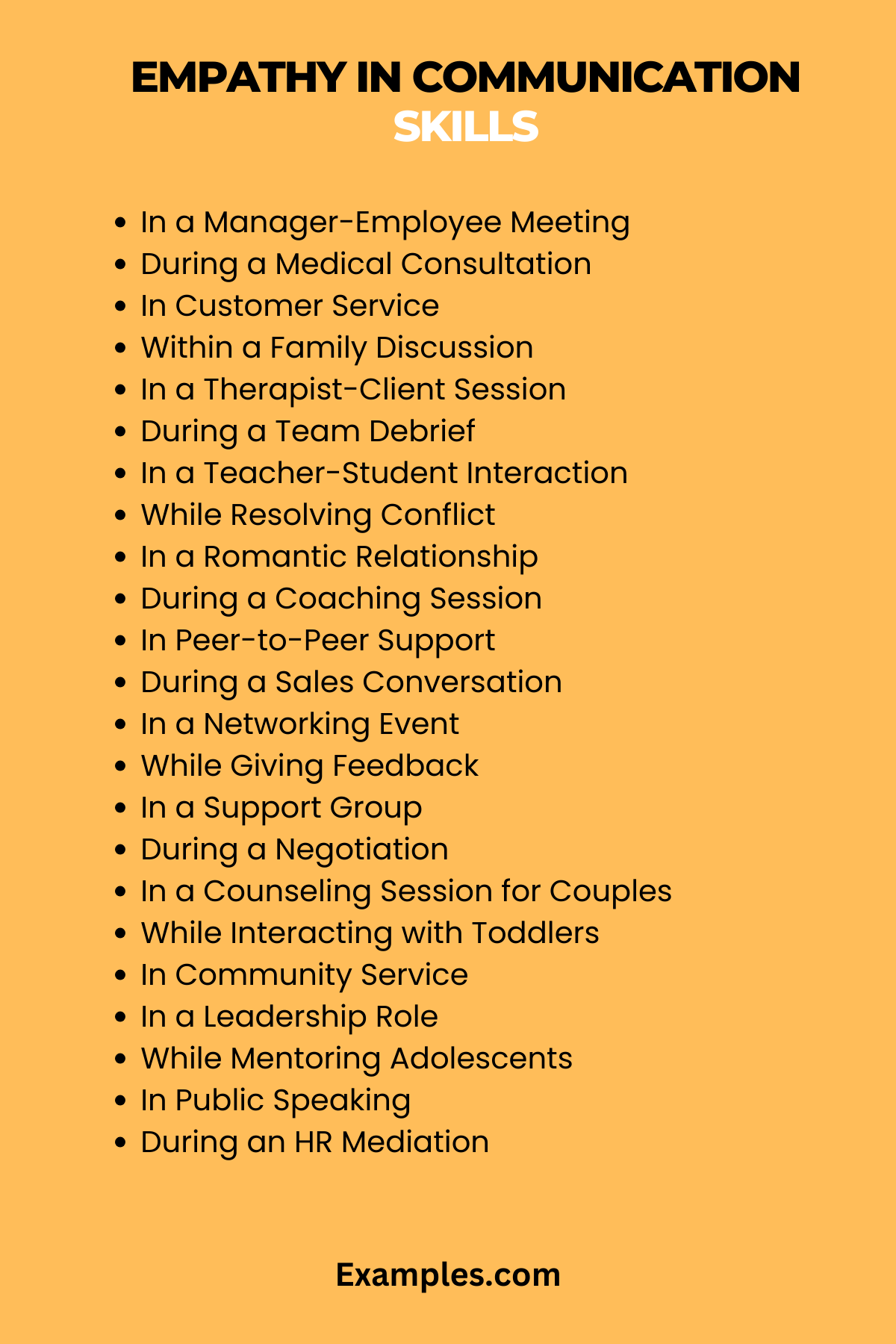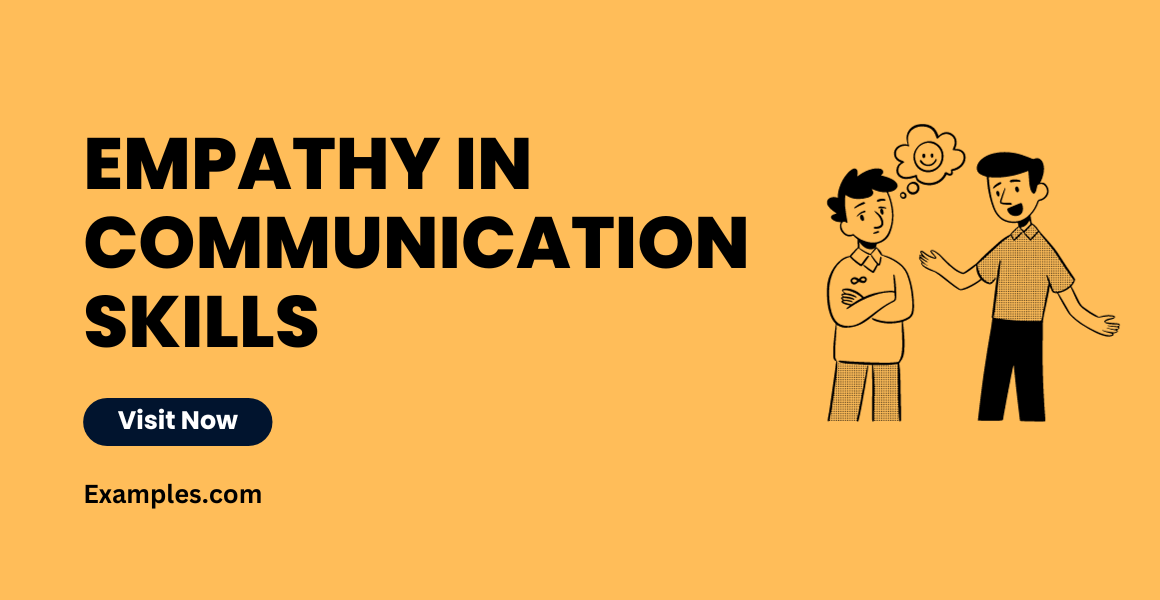Empathy in Communication Skills
Empathy is a vital component in the tapestry of Communication Skills, acting as a bridge to deeper understanding and stronger relationships. This comprehensive guide delves into how empathy enhances our interactions, backed by practical Communication Examples. From personal conversations to professional settings, understanding and integrating empathy is crucial for meaningful connections. Here, we’ll explore its role and offer real-world examples, showcasing how empathy can transform everyday communication.
What is Empathy in Communication?
Empathy in Communication Skills is the ability to understand and share the feelings of another person. It involves actively listening, recognizing emotions in others, and responding with compassion and understanding. In simple terms, it’s about putting yourself in someone else’s shoes and viewing situations from their perspective. This skill is crucial for building strong, empathetic connections and fostering effective, meaningful communication.

What is the Best Example of Empathy in Communication Skills?
One of the best examples of Empathy in Communication Skills can be seen in a therapeutic or counseling setting. In such an environment, a counselor or therapist actively listens to their client, understanding their feelings and experiences without judgment. They respond with compassion and validation, making the client feel heard and supported. For instance, if a client is discussing a personal loss, the therapist might say, “I can see how that experience has deeply affected you. It’s understandable to feel that way.” This approach not only demonstrates empathy but also helps in building a trusting and healing relationship.

30 Empathy in Communication Skills
Empathy in Communication Skills is a transformative tool that fosters deeper understanding and stronger connections. It involves stepping into another’s shoes, actively listening, and responding with sensitivity and understanding. In this guide, we explore how empathy enhances Communication Examples across various contexts, from personal relationships to professional interactions. Embracing empathy leads to more effective, compassionate, and meaningful communications, creating an environment of trust and mutual respect.

- In a Manager-Employee Meeting: A manager acknowledges an employee’s challenges, saying,
Example: “I understand this project has been demanding. How can I support you better?” - During a Medical Consultation: A doctor empathetically addresses a patient’s concerns, stating,
Example: “I hear your worries about the treatment; let’s explore your options together.” - In Customer Service: A service representative validates a customer’s complaint, replying,
Example: “It must be frustrating to experience this issue; let me help resolve it.” - Within a Family Discussion: A parent shows understanding towards a child’s viewpoint, expressing,
Example: “I see why you feel that way about your curfew; let’s discuss a compromise.” - In a Therapist-Client Session: A therapist conveys empathy for a client’s experience, saying,
Example: “It sounds like you’ve been through a lot; your feelings are completely valid.” - During a Team Debrief: A team leader recognizes the group’s effort, commenting,
Example: “I appreciate everyone’s hard work under these tight deadlines.” - In a Teacher-Student Interaction: A teacher empathizes with a student’s struggle, noting,
Example: “I can see you’re finding this topic challenging; how can I assist you better?” - While Resolving Conflict: An individual acknowledges the other’s perspective, stating,
Example: “I understand your point of view; let’s find common ground.” - In a Romantic Relationship: A partner shows empathy during a disagreement, saying,
Example: “I get why that upset you; let’s talk about how we can avoid this in the future.” - During a Coaching Session: A coach empathizes with a client’s setbacks, remarking,
Example: “It’s normal to feel discouraged at times; what’s important is how you move forward.” - In Peer-to-Peer Support: A friend listens and responds empathetically to another’s problems, saying,
Example: “That sounds really challenging; I’m here for you.” - During a Sales Conversation: A salesperson relates to a customer’s needs, commenting,
Example: “I understand why this feature is important to you; let me show you how it works.” - In a Networking Event: A professional empathizes with a colleague’s industry challenges, stating,
Example: “The changes in our field can be overwhelming; how are you adapting?” - While Giving Feedback: A supervisor delivers constructive feedback empathetically, saying,
Example: “I know this area is a bit challenging for you, but I’ve seen your potential to grow.” - In a Support Group: A group member empathizes with another’s experience, sharing,
Example: “Your journey resonates with me; how can the group support you?” - During a Negotiation: A negotiator acknowledges the other party’s concerns, stating,
Example: “I see your points; let’s work towards a solution that benefits both of us.” - In a Counseling Session for Couples: A counselor validates both partners’ feelings, noting,
Example: “Both of your feelings are important; let’s explore how we can address them.” - While Interacting with Toddlers: A caregiver shows empathy towards a toddler’s frustration, saying,
Example: “I see you’re upset because your toy broke; let’s find a way to fix it.” - In Community Service: A volunteer empathizes with the beneficiaries’ situation, expressing,
Example: “I can only imagine how difficult this has been; how can I assist you more effectively?” - During a Conflict Resolution Workshop: A facilitator empathizes with participants’ perspectives, stating,
Example: “It’s important to understand each other’s views to resolve conflicts.” - In a Leadership Role: A leader empathizes with their team’s challenges during change, commenting,
Example: “Change can be tough; I’m open to hearing your concerns and suggestions.” - While Mentoring Adolescents: A mentor relates to a teen’s concerns, saying,
Example: “I remember feeling uncertain at your age; let’s talk about your goals.” - In Public Speaking: A speaker connects with the audience’s interests, noting,
Example: “I know many of you have faced similar challenges; let’s explore solutions together.” - During an HR Mediation: An HR representative understands both sides of a workplace dispute, stating,
Example: “Both perspectives are valid; let’s find a fair resolution.” - In Parent-Teacher Meetings: A teacher shows empathy towards a parent’s concerns about their child, saying,
Example: “Your concern for your child’s progress is understandable; here’s how we can work together.” - In a Crisis Response Team: A team member acknowledges the stress of the situation, commenting,
Example: “This crisis is tough on all of us; let’s support each other through this.” - In a Feedback Session for Students: A tutor empathetically addresses a student’s learning challenges, stating,
Example: “I can see you’re struggling with this concept; let’s try a different approach.” - In a Customer Feedback Call: A business representative empathizes with customer feedback, responding,
Example: “Thank you for your honest feedback; we’re working to improve our services.” - In a Professional Development Seminar: A speaker empathizes with the challenges of career growth, noting,
Example: “Navigating your career path isn’t easy; let’s discuss strategies for success.” - In a Youth Mentorship Program: A mentor relates to a young adult’s aspirations, saying,
Example: “Your ambition is inspiring; let’s plan how to achieve your goals.”
Importance of Empathy in Communication Skills
Empathy is a cornerstone in effective Communication Skills, crucial for understanding and connecting with others. It bridges gaps and fosters deeper, more meaningful interactions in various contexts.
- Understanding Emotional Dynamics: Empathy in Communication Skills is crucial as it allows individuals to understand the emotional dynamics of others. By recognizing emotions, we foster deeper connections, essential in both personal and professional settings.
- Building Trust and Rapport: Through Empathy, trust and rapport are established, making conversations more meaningful and effective. It transforms simple interactions into valuable experiences, enhancing mutual understanding.
- Enhancing Conflict Resolution: Empathy plays a vital role in conflict resolution. Understanding different perspectives through Empathy in Communication Skills can lead to more amicable solutions and less friction.
- Improving Customer Relations: In customer service, Empathy is a key component. It helps in understanding customer needs better, thereby improving satisfaction and loyalty.
- Strengthening Leadership Abilities: Leaders with strong Empathy in Communication Skills are more effective. They understand their team’s needs and motivations, leading to better management and a harmonious workplace.
- Facilitating Better Team Dynamics: Empathy encourages positive team dynamics. It leads to a more cooperative environment where members feel valued and understood.
- Supporting Emotional Intelligence Development: Empathy is a component of emotional intelligence. Enhancing Empathy in Communication Skills contributes to overall emotional intelligence, vital in various life aspects.
- Aiding in Personal Relationships: Empathy strengthens personal relationships. By understanding and valuing others’ feelings, relationships become deeper and more fulfilling.
- Promoting Inclusivity and Understanding: Empathy fosters an inclusive environment by appreciating diverse perspectives. It breaks down barriers and promotes understanding among different groups.
- Enhancing Negotiation Skills: In negotiations, Empathy helps in understanding the other party’s position, leading to more effective and mutually beneficial outcomes.
Role of Empathy in Communication Skills
Empathy plays a pivotal role in enhancing Communication Skills, facilitating better understanding and stronger relationships. It is integral to effective communication, whether in personal or professional settings.
- Facilitating Active Listening: Empathy encourages active listening. By empathetically listening, we can comprehend the underlying messages in conversations, leading to better communication.
- Encouraging Openness and Honesty: When empathy is present in communication, it encourages openness and honesty. People feel safer expressing their true thoughts and feelings.
- Reducing Misunderstandings: Empathy in Communication Skills reduces misunderstandings. By understanding others’ viewpoints, misinterpretations are minimized, leading to clearer communication.
- Enhancing Non-Verbal Communication: Empathy enhances the ability to read and interpret non-verbal cues, an essential part of Communication Skills. Recognizing subtle gestures and expressions can convey understanding without words.
- Promoting Compassionate Responses: With Empathy, responses in conversations are more compassionate and considerate, fostering a supportive communication environment.
- Improving Persuasive Abilities: Understanding others’ feelings and perspectives through Empathy improves persuasive communication, allowing messages to be tailored more effectively to the audience.
- Supporting Conflict De-escalation: In tense situations, Empathy in Communication Skills plays a crucial role in de-escalating conflicts, helping to understand and address the root causes.
- Aiding in Feedback Delivery: When giving feedback, Empathy ensures it is constructive and considerate, making it more likely to be well-received and acted upon.
- Enhancing Teaching and Mentoring Skills: Teachers and mentors with strong Empathy better understand their students’ or mentees’ needs, leading to more effective teaching and guidance.
- Boosting Counseling and Therapy Efficacy: For professionals in counseling or therapy, Empathy in Communication Skills is indispensable, as it helps in building a strong, therapeutic alliance with clients.
Different Ways to Communicate with more Empathy
Mastering Empathy in Communication Skills involves various techniques and approaches. These methods enrich interactions, making them more compassionate and understanding.
- Active Listening: Practicing active listening is a primary way to communicate with more Empathy. It involves fully concentrating, understanding, and responding to what is being said.
- Asking Open-Ended Questions: Utilizing open-ended questions encourages a deeper understanding of the speaker’s perspective, demonstrating Empathy in Communication Skills.
- Reflecting and Paraphrasing: Reflecting and paraphrasing what the speaker has said shows that you are actively engaged and empathetic to their thoughts and feelings.
- Showing Genuine Interest: Displaying genuine interest in what others say and feel is a powerful way to express Empathy in communication.
- Being Non-Judgmental: Approaching conversations with a non-judgmental attitude fosters an empathetic and safe environment for open communication.
- Using Affirming Responses: Affirming responses, such as nodding or verbal acknowledgments, demonstrate Empathy and encourage further sharing.
- Avoiding Interruptions: Allowing the speaker to complete their thoughts without interruption is a respectful and empathetic way to communicate.
- Expressing Understanding: Verbally expressing understanding and validation of the speaker’s feelings and perspectives shows deep Empathy.
- Maintaining Eye Contact: Appropriate eye contact during conversations conveys attentiveness and empathy.
- Respecting Personal Space: Understanding and respecting personal space is a non-verbal way of showing Empathy in Communication Skills.
How to Improve your Empathy in Communication Skills
Improving Empathy within your Communication Skills is a journey of self-growth and understanding. It involves conscious efforts and strategies that enhance one’s ability to empathize effectively.
- Self-Reflection: Regular self-reflection helps in identifying personal biases and improving Empathy in Communication Skills.
- Seeking Diverse Perspectives: Actively seeking and understanding diverse perspectives broadens empathy and enhances communication skills.
- Practicing Mindfulness: Mindfulness practices help in being present in conversations, which is essential for empathetic communication.
- Engaging in Active Listening Exercises: Participating in active listening exercises can sharpen one’s ability to understand and empathize with others.
- Reading Fiction: Reading fiction exposes individuals to different characters and situations, which can enhance one’s ability to empathize.
- Attending Workshops: Participating in workshops focused on Empathy in Communication Skills can provide practical tools and techniques for improvement.
- Observing Skilled Communicators: Observing and learning from individuals who excel in empathetic communication can be highly beneficial.
- Receiving Feedback: Constructive feedback on communication style can highlight areas for improvement in empathy.
- Role-Playing Exercises: Engaging in role-playing exercises helps to understand and empathize with different perspectives.
- Practicing Patience: Developing patience is key to becoming more empathetic in communication, as it allows time to fully understand others’ viewpoints.
Cultivating Empathy in Communication Skills is vital for personal and professional growth. This guide highlights the importance, roles, methods, and improvement strategies for empathy, offering practical tips for enhanced understanding and connection. By prioritizing empathy, individuals can foster more meaningful relationships, resolve conflicts effectively, and build stronger communities. It’s an invaluable skill that enriches every aspect of communication.



